Related Research Articles

The 1996 United States presidential election was the 53rd quadrennial presidential election, held on Tuesday, November 5, 1996. Incumbent Democratic President Bill Clinton defeated former Senate Majority Leader Bob Dole, the Republican nominee, and Ross Perot, the Reform Party nominee and 1992 presidential candidate.

The Bharatiya Janata Party is a political party in India, and one of the two major Indian political parties alongside the Indian National Congress. Since 2014, it has been the ruling political party in India under Narendra Modi, the incumbent Indian prime minister. The BJP is aligned with right-wing politics, and its policies adhere to Hindutva, a Hindu nationalist ideology. it has close ideological and organisational links to the Rashtriya Swayamsevak Sangh (RSS). As of March 2023, it is the country's biggest political party in terms of representation in the Parliament of India as well as state legislatures.

Haradanahalli Doddegowda Deve Gowda is an Indian politician who served as the 11th prime minister of India from 1 June 1996 to 21 April 1997. He was previously the 14th Chief Minister of Karnataka from 1994 to 1996. He presently is a Member of Parliament in the Rajya Sabha representing Karnataka. He is the national president of the Janata Dal (Secular) party.Born in a farming family, he joined the Indian National Congress party in 1953, and remained a member until 1962. He was imprisoned during the Emergency. He became President of the state unit of Janata Dal in 1994, and was considered to be a driving force in the party's victory in Karnataka. He served as the 8th Chief Minister of Karnataka from 1994 to 1996. In the 1996 general elections, no party won enough seats to form a government. When the United Front, a coalition of regional parties, formed the central government with the support of the Congress, Deve Gowda was unexpectedly chosen to head the government and was elected Prime Minister. During his tenure as prime minister, he also served as Home Minister for some time. His prime ministerial tenure lasted for less than a year. After his prime ministerial tenure, he was elected to the 12th (1998), 14th (2004), 15th, and 16th Lok Sabha, as Member of Parliament for the Hassan Lok Sabha constituency. He lost Lok Sabha elections in 2019 from Tumkuru but has been elected to Rajya Sabha since.
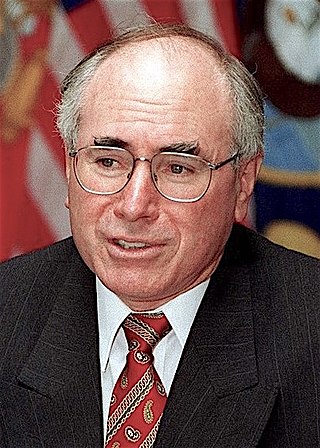
The 1996 Australian federal election was held to determine the members of the 38th Parliament of Australia. It was held on 2 March 1996. All 148 seats of the House of Representatives and 40 seats of the 76-seat Senate were up for election. The centre-right Liberal/National Coalition led by Opposition Leader John Howard of the Liberal Party and coalition partner Tim Fischer of the National Party defeated the incumbent centre-left Australian Labor Party government led by Prime Minister Paul Keating in a landslide victory. The Coalition won 94 seats in the House of Representatives, which is the largest number of seats held by a federal government to date and the second time a party won over 90 seats at a federal election.

The 1996 United States Senate elections were held on November 5, with the 33 seats of Class 2 contested in regular elections. Special elections were also held to fill vacancies. They coincided with the presidential election of the same year, in which Democrat Bill Clinton was re-elected president.
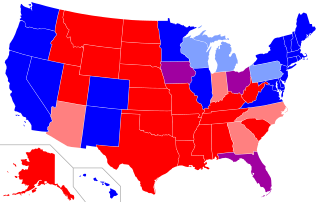
Starting with the 2000 United States presidential election, the terms "red state" and "blue state" have referred to U.S. states whose voters vote predominantly for one party — the Republican Party in red states and the Democratic Party in blue states — in presidential and other statewide elections. By contrast, states where the vote fluctuates between the Democratic and Republican candidates are known as "swing states" or "purple states". Examining patterns within states reveals that the reversal of the two parties' geographic bases has happened at the state level, but it is more complicated locally, with urban-rural divides associated with many of the largest changes.

The 1996 United States House of Representatives elections was an election for the United States House of Representatives on November 5, 1996, to elect members to serve in the 105th United States Congress. They coincided with the re-election of President Bill Clinton. Democrats won the popular vote by almost 60,000 votes (0.07%) and gained a net of two seats from the Republicans, but the Republicans retained an overall majority of seats in the House for the first time since 1928.

The 1996 United States Senate election in Massachusetts took place on November 5, 1996. Incumbent Democratic U.S. Senator John Kerry won re-election to a third term over Republican Bill Weld, the Governor of Massachusetts.

General elections were held in India on 27 April, 2 May and 7 May 1996 to elect the members of the 11th Lok Sabha. The elections resulted in a hung parliament with a single party having a clear majority. The Bharatiya Janata Party, which had won the most seats, formed a short-lived government under Prime Minister Atal Bihari Vajpayee. However, two weeks later the United Front coalition was able to secure a parliamentary majority and H. D. Deve Gowda of Janata Dal became Prime Minister. In 1997 Inder Kumar Gujral, also from the United Front, succeeded Gowda as Prime Minister. Due to the instability, early elections were held in 1998. The elections were the first since 1980 in which every states' seats were elected in a single election period.

The United States House of Representatives elections in California, 1996 was an election for California's delegation to the United States House of Representatives, which occurred as part of the general election of the House of Representatives on November 5, 1996. The delegation went from being tied to slightly majority-Democratic, with Democrats gaining 3 seats.
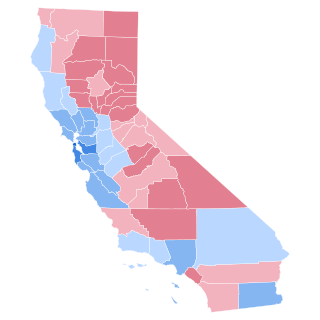
The 1996 United States presidential election in California took place on November 5, 1996, as part of the 1996 United States presidential election. Voters chose 54 representatives, or electors to the Electoral College, who voted for president and vice president. California, was won by Incumbent President Bill Clinton (D) over Senator Bob Dole (R), with Clinton winning 51.1% to 38.21% by a margin of 12.89%. Billionaire businessman Ross Perot finished in third, with 6.96% of the popular vote.

The 1996 California State Assembly elections were held on November 5, 1996. California's State Assembly in its entirety comes up for election in even numbered years. Each seat has a two-year term and members are limited to three 2-year terms. All 80 biennially elected seats in the Assembly were up for election this year. Democrats gained 4 seats, retaking control of the Assembly after narrowly losing control in 1994.
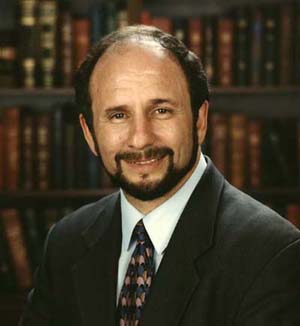
The 1996 United States Senate election in Minnesota was held on November 5, 1996. Incumbent Democrat Paul Wellstone won reelection to a second term defeating former Republican Senator Rudy Boschwitz in a rematch.

The 1996 United States elections were held on November 5. Democratic President Bill Clinton won re-election, while the Republicans maintained their majorities in both houses of the United States Congress.

The 1996 United States presidential election in Virginia took place on November 5, 1996, as part of the 1996 United States presidential election. Voters chose 13 representatives, or electors to the Electoral College, who voted for president and vice president.

The 1996 United States presidential election in Illinois took place on November 5, 1996, as part of the 1996 United States presidential election. Voters chose 22 representatives, or electors to the Electoral College, who voted for president and vice president.

Arkansas is a state in the South Central region of the United States. Since its admission to the Union in June 1836, it has participated in 46 United States presidential elections. In the realigning 1860 election, Arkansas was one of the ten slave states that did not provide ballot access to the Republican nominee, Abraham Lincoln. Subsequently, John C. Breckinridge won the state by a comfortable margin, becoming the first third party candidate to win Arkansas. Soon after this election, Arkansas seceded from the Union and joined the Confederacy. Following the secession, Arkansas did not participate in the 1864 presidential election. After the Civil War, Arkansas was readmitted to the Union in 1868. In the 1872 election, all six of Arkansas's electoral votes were invalidated due to various irregularities including allegations of electoral fraud.

Since Wisconsin's admission to the Union in May 1848, it has participated in 44 U.S. presidential elections. In the 1924 presidential election, Robert M. La Follette became the only third-party presidential candidate to win in Wisconsin, with 53.96% of the popular vote. Since the 1988 presidential election, Wisconsin has leaned towards the Democratic Party in presidential elections, however, in 2016 the Republican Party's candidate Donald Trump won the state by a margin of 0.77%.

Since Wyoming's admission to the Union in July 1890, it has participated in 33 United States presidential elections, always having 3 electoral votes. Wyoming was the first place in America to grant women the right to vote, in 1869, well before it joined the Union in 1890. This was a significant milestone for women's suffrage and paved the way for other states to follow suit. As a state with a strong Republican tradition, Wyoming tends to favor the Republican Party in presidential elections. It has consistently voted for Republican candidates in recent decades and is considered a reliably red state. When Wyoming participated in its first presidential election in 1892, Republican candidate Benjamin Harrison won the state with 50.52% of the vote. Harrison's Democratic opponent, Grover Cleveland, who went on to win the election, did not even appear on the ballot in Wyoming.
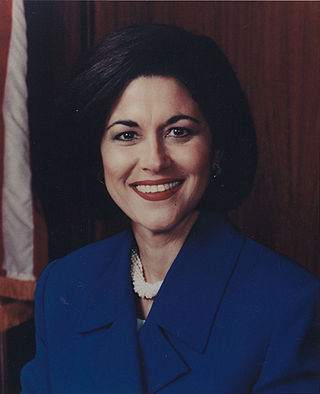
The 1996 San Diego mayoral election was held on Tuesday, March 26, 1996, to elect the mayor for San Diego. Incumbent mayor Susan Golding stood for reelection.
References
- ↑ "Statistical Report on General Election, 1996" (PDF). Election Commission of India. p. 8. Retrieved 6 May 2017.